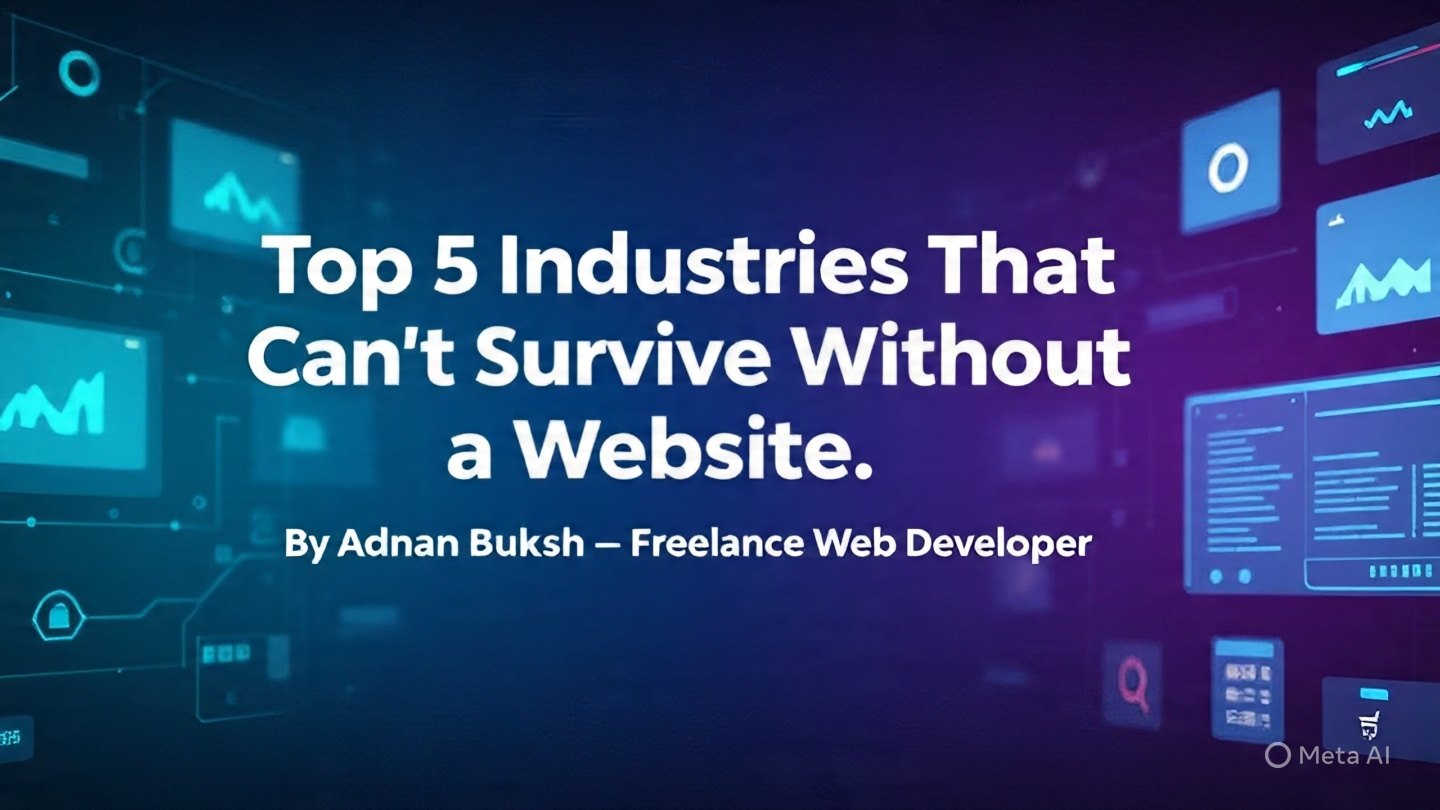
- Introduction
- 1. Healthcare Professionals (Doctors, Clinics, Dentists, Therapists)
- 2. Restaurants, Cafés & Food Businesses
- 3. Manufacturing & Industrial Businesses
- 4. Retail & eCommerce Brands
- 5. Professional Service Providers (Consultants, Coaches, Lawyers, Accountants)
- Actionable Advice: How to Get Started the Right Way
- FAQs
Introduction
In today’s fast-moving digital world, having a professional website is no longer optional — it’s a basic business survival tool. Whether you’re a doctor, a café owner, or a local service provider, your customers are online. They expect to find your business with a quick Google search, browse your offerings, check reviews, and take action — all in a matter of seconds.
Yet surprisingly, thousands of small businesses in India and around the world still operate without a proper website. Many rely only on social media, messaging apps, or third-party directories. This might seem manageable for now, but it’s a risky, limiting approach — especially as online behavior continues to evolve.
Consider this:
- 97% of people search online to find local businesses (Source: BrightLocal)
- Over 70% of users judge a business’s credibility based on its website design
- And in competitive industries, not having a website can lead to serious losses in trust, traffic, and revenue
Think about it — if someone is searching “best dentist near me” or “plumber in [city]”, and you don’t appear on the first page of results (or at all), you’re invisible to them. Your competitors with well-optimized websites will take the lead — even if their service isn’t better than yours.
This blog highlights the top 5 industries where a website is critical — not just for growth, but for basic survival in 2025. I’ll explain what features your website should have, what you risk without one, and how partnering with a freelance WordPress developer can get you online fast, without the high cost of agencies.
Let’s begin with the industry where trust and credibility matter most: healthcare.
1. Healthcare Professionals (Doctors, Clinics, Dentists, Therapists)

Why a Website is No Longer Optional
Whether you’re a general physician, dental clinic, physiotherapist, or mental health counselor, your patients are researching online before they ever call or visit. Today’s healthcare consumer expects transparency, convenience, and trust — all of which start with your website.
Without a professional website:
- Patients can’t confirm your credentials or services
- Your clinic may not appear in “doctor near me” search results
- You miss out on appointment requests outside business hours
- You look less credible compared to modernized competitors
Let’s say you’re a dentist in Mumbai. A potential patient types “best dental clinic in Bandra” into Google. If you don’t have a website — or worse, you have a slow, outdated one — you’re instantly disqualified. That same patient will instead choose a clinic with a clear website showing treatment options, patient testimonials, and a simple booking form.
Essential Website Features for Healthcare Providers
Here’s what every medical professional or clinic should include on their site:
- Doctor/Staff Profiles: Build trust by showcasing your credentials and experience
- Service Listings: Detail your treatments, specializations, and procedures
- Appointment Booking: Enable patients to schedule online anytime
- Reviews and Testimonials: Display real feedback from happy patients
- Contact Page with Google Maps: Make it easy to locate and reach you
- Mobile Optimization: Ensure patients can view and use your site on their phones
Why You Need a Professional Build
Medical websites must be fast, secure, and easy to update. Hiring a freelance WordPress developer ensures your website is professionally built, GDPR/HIPAA-conscious, and SEO-ready — without the agency price tag. You get a personalized approach that focuses on conversions and trust, both of which are critical in healthcare.
2. Restaurants, Cafés & Food Businesses
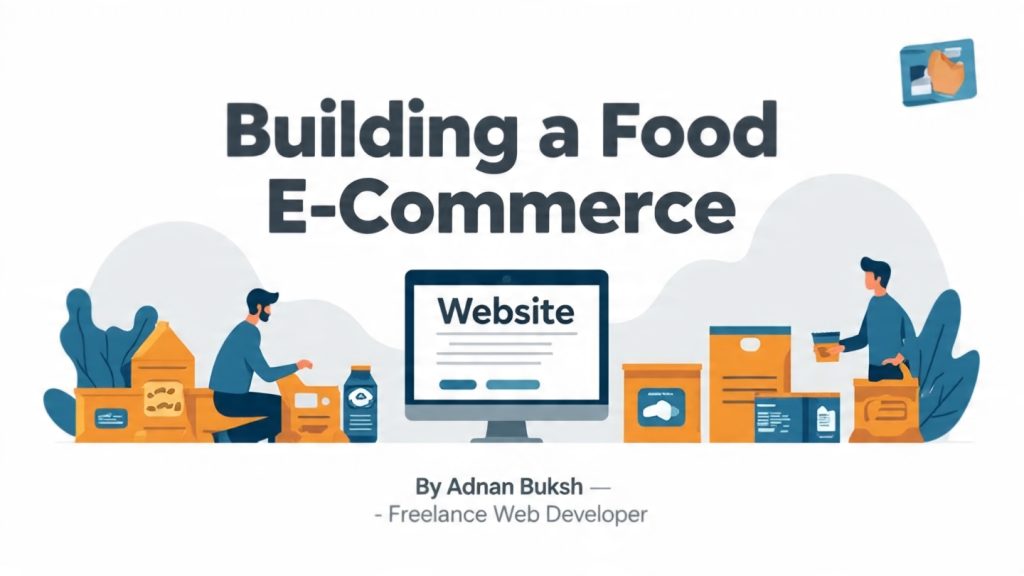
Why a Website is a Must in the Food Industry
In 2025, people rarely walk into a restaurant without first checking it out online. Whether it’s a quick meal, weekend dinner plan, or local bakery, users search for menus, reviews, and photos before deciding where to eat or order from.
If you run a food business — a restaurant, food truck, café, bakery, or cloud kitchen — and you don’t have a proper website, you’re losing customers before they even taste your food.
Let’s say a customer in Pune searches for “Chinese restaurant near me.” Google shows local results. But if your business isn’t linked to a well-optimized website, it may not show up — even if your food is better than anyone else’s nearby. You lose visibility, online orders, and valuable first impressions.
Relying only on Zomato, Swiggy, or Instagram limits your control. These platforms charge high fees, control how your brand looks, and don’t let you build direct relationships with customers.
What Your Food Business Website Should Include:
To stay competitive and grow, your restaurant website should offer:
- Full Digital Menu: Clear, readable, mobile-friendly
- High-Quality Photos: Highlight your food, ambiance, and customer experience
- Online Reservation or Table Booking: Help diners plan ahead easily
- Online Ordering & Delivery Integration: Offer direct ordering to reduce app commissions
- Map & Location Info: Make it easy for customers to find you
- Google Review Integration: Display positive feedback and build trust
The Smart Choice for Food Entrepreneurs
Hiring a freelancer WordPress developer helps you launch a clean, fast-loading restaurant website with all the must-have features — from WooCommerce-based food ordering to contactless menus and Google Maps integration.
Compared to generic templates or costly app partnerships, a custom website gives you more profit, brand control, and long-term growth.
3. Manufacturing & Industrial Businesses
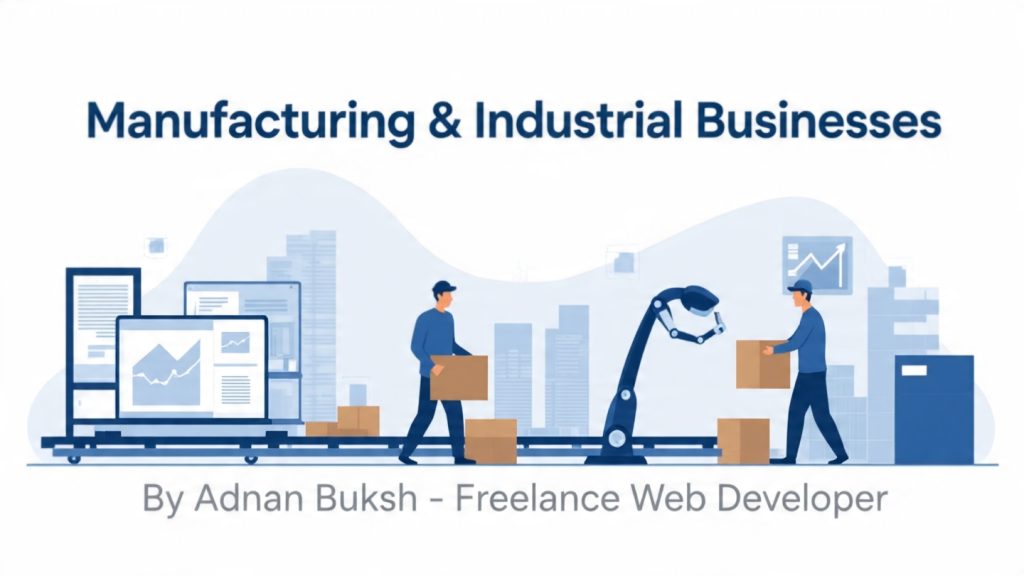
The manufacturing industry has seen rapid digital transformation, especially post-pandemic. Yet, a surprising number of small and mid-sized manufacturers still don’t have a professional website — or worse, have one that’s outdated, non-responsive, or lacking critical information.
In 2025, that’s a major liability.
Today’s B2B buyers and procurement managers don’t wait for trade shows or printed catalogs. They search online. If your manufacturing company doesn’t show up, you’re losing serious business to competitors who invested in digital visibility.
A well-designed website helps manufacturers:
- Showcase products, technical capabilities, and certifications
- Offer downloadable product catalogs or spec sheets
- Allow potential partners to submit RFQs (Request for Quotes)
- Present case studies, industry experience, and client logos
- Improve credibility with local and global buyers
Whether you’re an OEM, precision engineering firm, or contract manufacturer, your website acts as your 24/7 sales team. Partnering with a custom website development company or freelance WordPress developer ensures your site is not only visually professional but also structured for lead generation and SEO.
A smart website also integrates with CRMs, inventory systems, and B2B ordering platforms — helping streamline business operations while expanding market reach. If you’re not online, your competitors are taking your orders.
4. Retail & eCommerce Brands
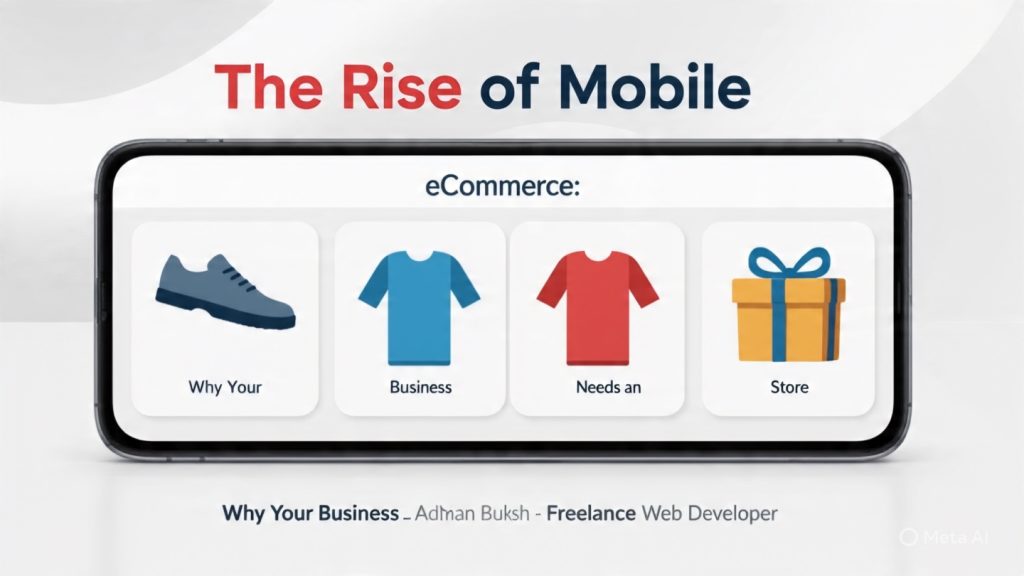
Why an Online Store Is Non-Negotiable in 2025
The retail landscape has changed forever. Consumers are shopping online more than ever — not just for electronics or clothing, but even for groceries, skincare, stationery, and niche products. If you sell physical goods but don’t have your own website, you’re handing your customers (and profits) to competitors.
Many small retailers still rely only on:
- Instagram or Facebook pages
- WhatsApp for orders
- Marketplaces like Amazon, Flipkart, or Meesho
While those platforms are useful, they come with limitations:
- You don’t own customer data
- You pay high commissions
- Your brand gets buried under competitors
- You can be suspended or restricted anytime
The solution? Your own eCommerce website — designed to sell, scale, and give you full control.
What Your Retail Website Should Offer
Whether you run a boutique, cosmetics store, artisan brand, or DTC startup, your website should include:
- Product Pages: With images, pricing, detailed descriptions, and shipping info
- Search & Filter Options: Help users find what they need quickly
- Cart & Secure Checkout: Accept payments via UPI, cards, wallets, or COD
- Order Tracking: Build trust by letting customers track deliveries
- Discounts & Coupons: Promote seasonal offers directly
- Email Collection: Build your mailing list for future marketing
- Mobile Optimization: Most online shoppers buy from their phones
Having a Shopify or WooCommerce-powered store built by a custom website development company or experienced freelancer WordPress developer allows you to go live fast, look professional, and start taking orders 24/7 — no coding knowledge needed.
Control Your Brand. Keep Your Profits.
Your own website gives you independence, better margins, and long-term scalability. You’re no longer tied to social algorithms or third-party fees. You build customer loyalty, SEO presence, and marketing power — all under your control.
5. Professional Service Providers (Consultants, Coaches, Lawyers, Accountants)
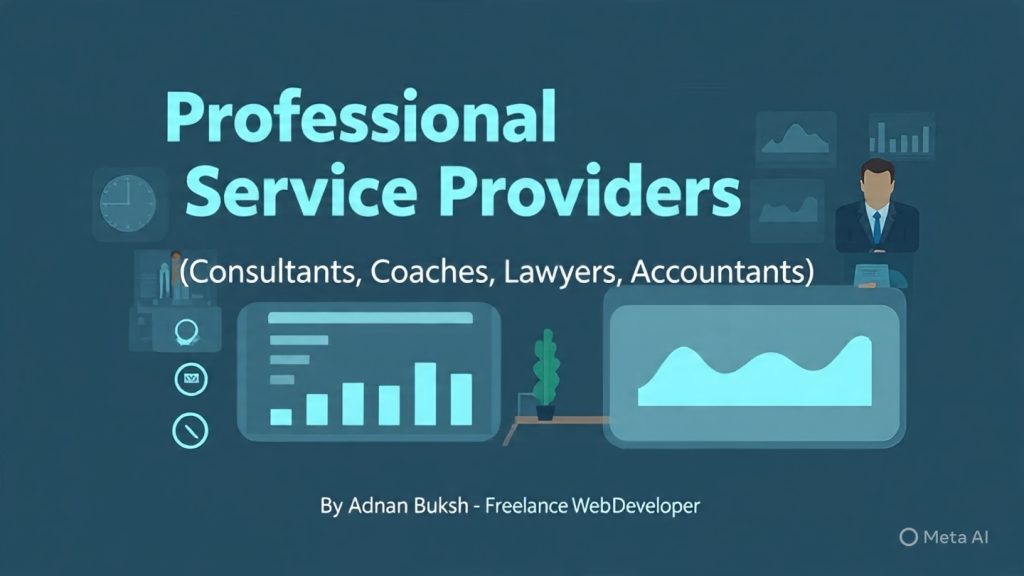
Why a Website is Essential for Authority and Client Trust
If you offer services built around your expertise — whether as a consultant, career coach, business advisor, lawyer, financial planner, or independent professional — your website is more than just a digital brochure. It’s your first impression, portfolio, sales tool, and trust builder.
Most potential clients will research you online before reaching out. If they find nothing — or only a basic LinkedIn profile — they may question your credibility. But a well-designed, content-rich website instantly sets you apart as a trusted, established expert.
Think about it: if someone is looking for a legal consultant in Bangalore or a startup business coach in Delhi, and your competitor has a clean website with testimonials, services, pricing, and a blog — who do you think they’ll contact?
What Your Professional Website Should Include
To build authority and convert high-quality leads, your site should have:
- About You Page: With your credentials, values, and client focus
- Detailed Service Pages: Explain what you offer and who it’s for
- Lead Capture Forms: Collect inquiries or offer free consultations
- Client Testimonials & Case Studies: Show real success stories
- FAQ Section: Answer objections and explain your process
- Professional Blog or Resources: Demonstrate thought leadership
- Booking Calendar Integration: Let clients schedule calls easily
This applies equally to coaches, legal professionals, accountants, and creative consultants. In 2025, the difference between being hired and being ignored often comes down to how you present yourself online.
Let Your Website Work While You Don’t
A strong personal brand backed by a fast, responsive WordPress website means you can generate leads even while you sleep. With the help of a freelance WordPress developer, you can get a professional site that matches your voice, highlights your services, and speaks to your ideal clients — all without spending agency-level budgets.
Actionable Advice: How to Get Started the Right Way
If you’re in any of the five industries we just covered and don’t yet have a website — or your current one isn’t working for you — here’s exactly what you should do next.
Step 1: Define Your Website Goals
Every business is different. Do you want to generate leads, take online bookings, sell products, or simply establish credibility? Get clear on what your site needs to do for you before jumping into design.
Step 2: Study Competitors in Your Niche
Look at what others in your industry are doing online — especially those doing it well. What pages do they include? What kind of content do they have? This will help you create a better version, not just a copy.
Step 3: Avoid Free Builders and Generic Templates
DIY platforms may look appealing, but they come with limitations: poor SEO, slow performance, and lack of flexibility. Your business deserves better — especially if you’re serious about attracting clients online.
Step 4: Hire a Freelance Web Developer (Who Gets Your Industry)
A freelancer WordPress developer gives you one-on-one attention, tailored design, and real support — without inflated agency fees. They’ll help you structure the site, write SEO-ready content, and optimize it for conversions.
Step 5: Launch Fast, Improve Continuously
You don’t need a 50-page website on day one. Start lean, test what works, and add features or content over time. The goal is to get live, get found, and get clients.
FAQs
Why is having a website so important for small businesses in 2025?
In today’s digital-first economy, customers expect every business to have a website — no matter how small. Whether you’re a local service provider or an online retailer, your website serves as your storefront, sales pitch, and trust signal. Without one, you lose visibility in search engines and miss out on potential leads. Having a professionally built site by a freelance WordPress developer helps you build credibility, rank in Google, and convert visitors into clients.
I already have a social media page — do I still need a website?
Yes, 100%. Social media platforms are useful, but they don’t replace the control, flexibility, or authority of a website. You’re at the mercy of algorithms, and you don’t truly own your audience. A website allows you to showcase services, collect leads, and appear in local search — especially if you’re working with a WordPress website development company or experienced freelancer who understands your business goals.
How much does a basic website cost for small businesses?
Website development costs can vary depending on your needs. A professionally developed WordPress website (5–7 pages) by a freelancer usually starts at ₹8000–₹12000 in India. Prices increase if you need advanced features like eCommerce, booking systems, or SEO integration. Compared to agency rates, working with a freelance website developer gives you better value, personal attention, and cost control.
Which is better for my business — WordPress, Shopify, or a custom solution?
It depends on your goals:
- For content-focused or service websites: WordPress is ideal.
- For online stores: Shopify or WooCommerce (on WordPress) works great.
- For unique functionality: A custom website development company may be better suited.
A website development consultant can help you choose the best option based on your goals, budget, and future plans.
What pages should a professional service website include?
At a minimum:
- Home
- About
- Services
- Contact
- Testimonials
Blog or Resources (optional)
A skilled WordPress web design agency or freelancer can help you structure each page to rank well and convert visitors into leads.
Can I get SEO with my WordPress website?
Absolutely. WordPress is one of the most SEO-friendly platforms. With the right plugins, speed optimization, and proper on-page structure, your site can rank well in Google. Most WordPress website development services also include basic SEO setup. To really grow, pair your site with ongoing SEO and content marketing.




Comments (2)
AI Music Generatorsays:
July 23, 2025 at 8:49 amGreat breakdown of industries that truly can’t afford to ignore having a website. I’ve especially seen professional service providers lose potential clients simply because people couldn’t verify their credibility online — no reviews, no website, nothing. It’s a timely reminder that even in the age of social media, a well-designed website is still the foundation of trust.
Adnan Bukshsays:
July 28, 2025 at 4:57 pmThanks for the Reply…